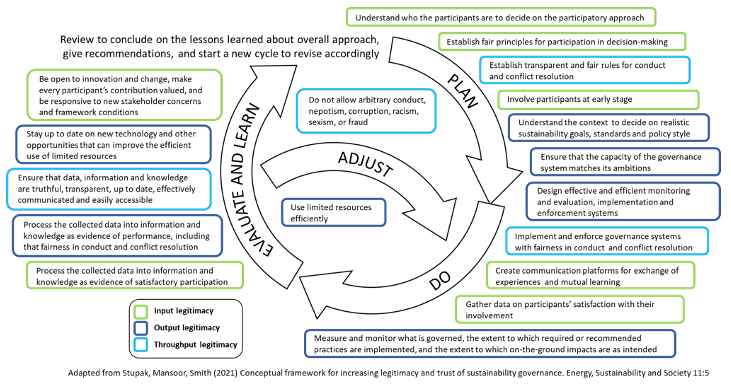New Publication – Conceptual framework for increasing legitimacy and trust of sustainability governance
Globally, public and private sustainability governance initiatives have proliferated as a means to regulate the sustainability of economic activities. However, a specific governance system may be more or less trusted as a legitimate regulator. In the context of bioenergy, some speak of a legitimacy crisis. Existing sustainability governance systems must therefore continue to develop, adjust and improve to meet new challenges and concerns to maintain their legitimacy and people’s trust in their usefulness as a means of making progress towards more sustainable societies.
This article develops conceptual tools to improve the understanding of these legitimacy crises, as well as the barriers and facilitating factors that allow sustainability governance to play a role in the transitioning to profoundly more sustainable societies. Bioenergy is used throughout the paper as an example to aid contextually in understanding the theoretical and abstract arguments.
The work was part of the IEA Bioenergy Inter-Task Project “Measuring, governing and gaining support for sustainable bioenergy supply chains”.
The article is also included in the thematic article collection Governing sustainability of bioenergy, biomaterial and bioproduct supply chains from forest and agricultural landscapes in Energy, Sustainability and Society. The collection was compiled with support from IEA Bioenergy Task 43, as a contribution to the work of the Task during the triennium 2015-2018
Short summary:
This comprehensive paper defines terminology and develops an adaptive governance model and governance research framework that integrates the broad range of existing literature to explain how the design of sustainability governance systems is linked to their effectiveness, people’s granting of legitimacy to the system, and their granting of trust in the governed activities being a solution that promotes sustainability. The conceptual tools can be used to systematically address situations where a sustainability governance crisis is experienced because trust is low or lacking.
Eight premises are identified that form the basis for the reasoning and arguments made in the paper. A critical premise is a common understanding of the applied terminology. The paper explains the following terms: sustainability, sustainability transition, sustainability governance, legitimacy, trust, and principal–agent relationships.
Based on the literature, the paper concludes that “good sustainability governance” requires high levels of input, output, and throughput legitimacy. Using these concepts, the paper expands on different aspects of legitimacy, and formulates and organizes criteria identified from the literature under three corresponding “good governance” principles. The criteria are embedded within an adaptive governance setting (Fig. 1). It is argued that a well-designed adaptive approach will positively affect the quality of the stakeholder participation (input legitimacy), the ability of the system to achieve environmental, social, economic or cultural sustainability goals and avoid undesired impacts (output legitimacy), and achieve efficient, transparent and unbiased implementation and enforcement of the system (throughput legitimacy).
Fig. 1. Model for adaptive sustainability governance with proposed linkages to open-ended criteria for “good” sustainability governance, organised under the legitimacy principles: input, output, and throughput legitimacy.
According to the model, continuous movement through successive adaptive cycles helps to deduce lessons learned and recommendations for revising and improving the governance system, so that it continues to address upcoming concerns or dissatisfactions, correct unintended impacts, and adapt to new technologies, knowledge, or framework conditions.
Monitoring, evaluation and research are critical elements of the adaptive cycle, as they increase the probability that the system effectively makes progress towards its goals, identifies and eliminates undesired impacts, and ensures that people are satisfied with the system, its conduct, and their own participation in its decision-making. In the absence of such monitoring, evaluation and research, the risk increases that a governance system will experience a legitimacy crisis.
The paper develops a “governance research framework”, which is intended to enhance the adaptive features of sustainability governance systems (Fig. 2). The framework shows why different scientific disciplines need to be involved and work together so as to allow the understanding and identification of the causes of existing and emerging sustainability governance crises and finding solutions to them. Depending on the challenges, studies may for example examine if different policies have led to the desired outcomes, by quantifying these directly as measured impacts (A, Fig. 2) or assessed as perceived impacts (B, Fig. 2). Another example is examining if people’s granting of legitimacy to a governance system links to the available documentation of its impacts or actor’s compliance with best practices (C).
Fig. 2. Conceptual governance research framework for integrated analysis to better understand how legitimacy and trust are granted to sustainability governance systems, and what makes sustainability governance “good”. Colored arrows show how research questions can be asked by integration of different research focuses and, consequently, input from different scientific disciplines, see the text for examples A, B and C.
Knowledge generated from the use of the framework, for example, through literature reviews or interdisciplinary research projects, may form a basis for providing comprehensive policy recommendations on how to practically solve complex legitimacy and trust crises related to sustainability governance.
In a globalised world with high levels of connectivity and interdependence, the paper suggests that until international cooperation at a global scale improves, “good” sustainability governance systems that allow for gradual improvements at smaller scales are likely to be the most important tools for transitioning towards more sustainable societies. However, in the process of designing governance systems or keeping them “good”, it is a political decision to make the trade-off between individual principles or between criteria, if there is conflict between them. This is the condition in democratically governed societies.




